#bsd season 4 opening
Explore tagged Tumblr posts
Text
BSD S4 OPENING
the faces of the characters - the colours and the order in which they show up
ADA - green / turquoise
PM - purple (with the exception of Chuuya and Akutagawa who are red)
DOA - blue
Hunting Dogs - white
The Guild - yellow
Special Division for Unusual Powers* - brownish
(The colours don't always show the affiliation to an organisation - depending on the character, they show either association or affiliation. Tho there is kind of an inconsistency - Poe is shown in the ADA's colours meanwhile Lucy in the Guild's ones).
* anime onlys don't read this paragraph ig - since the brown colour was used for Ango, Taneda and Muchitarou, maybe it doesn't mean it was used for the special division, but just for the rest of the characters
So now the screencaps! (only the first ten, since I can't add more - the rest will be in the next parts).
Btw there are 34 characters shown during that part!
1. Osamu Dazai
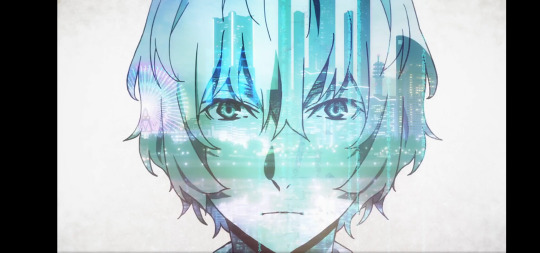
2. Fyodor Dostoyevsky
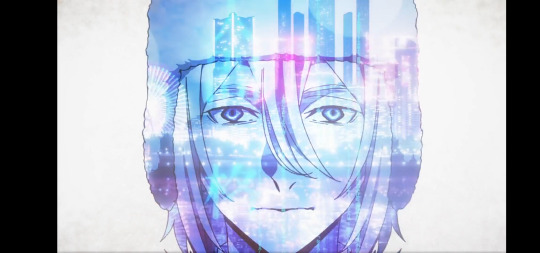
3. Michizou Tachihara

4. Ranpo Edogawa

5. Francis Scott Key Fitzgerald
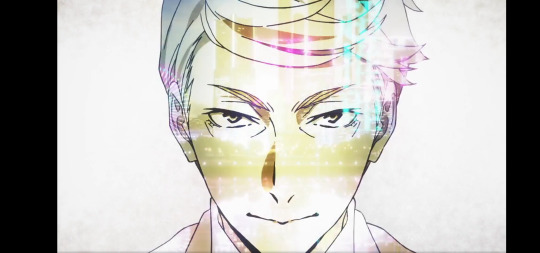
6. Ango Sakaguchi

7. Tetchou Suehiro

8. Aya Koda

9. Ouchi Fukichi

10. Yukichi Fukuzawa
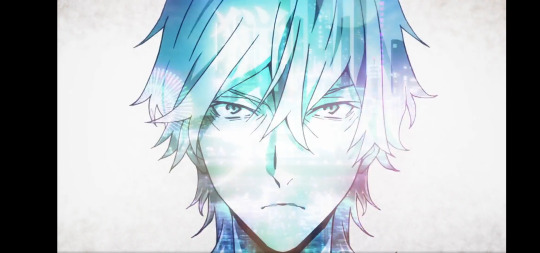
Part 1, Part 2, Part 3, Part 4
#i love this op#bsd#bungou stray dogs#bsd season 4#bsd season 4 opening#bsd dazai#bsd fyodor#bsd tachihara#bsd ranpo#bsd fitzgerald#bsd ango#bsd tecchou#bsd aya#bsd fukuchi#bsd fukuzawa
73 notes
·
View notes
Text
Studio Bones really put their all into animating Chuuya for the 2 seconds he is in the trailer for. Not that I'm complaing, bro looks like he's from a romance anime




#bsd#bungou stray dogs#bsd season 4#chuuya nakahara#chuuya bsd#bsd season 4 opening#who gave him permission to be this pretty#the gender envy this man gives me#that moment of do I want to be with him or be him
80 notes
·
View notes
Text
HE DID IT AGAIN

congratulations to nakahara chuuya for winning the oscar
#remember when the trailer came out? yeah#I'm not complaining!! In fact I am encouraging him to keep doing that#chuuya#bsd season 4 opening#bsd season 4
144 notes
·
View notes
Text
so bECAUSE OF THE SSKK BSD SEASON 5 ENDING I WENT OUTSIDE AND STARTED SCREAMING AT 12AM SO NATURALLY SOMEONE THOUGHT I WAS BEING MURDERED AND CALLED THE POLICE AND WHEN THEY GOT HERE I HAD TO GIVE THEM MY EXPLANATION FOR SCREAMING AT 12AM SO I JUST SAID SSKK AND ONE OF THE COPS EYES SUDDENLY GOT REALLY BIG AND THEN HE SAID “AKUTAGAWA IS BACK??!?” AND THEN HE WATCHED THE VIDEO ON HIS PHONE I HAVE A GROWN POLICE MAN SITTING IN MY DRIVEWAY CRYING AND CURSING BONES UNDER HIS BREATH HIS PARTER GAVE HIM A SHOCK BLANKET OH MY GOD
#sskk#shin soukoku#ryūnosuke akutagawa#bsd#bungou stray dogs#bsd s5#bsd season 5#I had planned to use this copypasta for the chapters 84-88 adaptation since I saw the season 4 (season four) opening#But then the chapters 84-88 adaptation was... Well.#Now my life has finally reached fullfillment by using the 2013 Homestuck meme#Agshjewifiewfelibegliugfe you can't understand. I'm so happy. I'm so tired because I've been having an insane schedule these days#and I basically feel so worn out that I'm just standing here lifelessly. And yet I'm so so happy ajhcahjfwaawskufb
511 notes
·
View notes
Text

The Decay of Angels, 3/5 🃏🎭📖
Another one of my recent artworks- the Decay of Angels (Nikolai, Fyodor, and Sigma) from Bungou Stray Dogs Season 4.
If crime organisations, why all of them pretty? 😩
My favourite out of them is Fyodor. I know I’ll sound biased if I relay my reasons but oh well. I’ve been reading Crime and Punishment and it’s so good it captured my heart so well. It’s a book I’ve been longing to find, considering that I have rejected or discontinued many other popular modern books like It Ends With Us, The Atlas Six, and the like.
Once I finish Crime and Punishment, I will be reading The Overcoat next. And probably reread The Tell-Tale Heart too…
Once again, I am open for commissions! Just DM me for details :D
#digital art#bungou stray dogs#bsd fanart#bsd#bsd season 4#bsd nikolai#nikolai gogol#bsd fyodor#fyodor mihayloviç dostoyevski#sigma bungou stray dogs#bsd s4#bsd dazai#decay of angels#fyodor dostoyevsky bsd#open for commissions
218 notes
·
View notes
Text
Bones already put the sskk v fukuchi fight in the s4 opening so what are they gonna do for s5 I’m scared
#what if they put aku d wording in the opening I’d have to be institutionalized#i’m frightened#bsd#bungo stray dogs#bsd manga#bsd spoilers#bsd akutagawa#bsd atsushi#bsd season 4#bsd season 5#sskk#shin soukoku
71 notes
·
View notes
Photo










Bungou Stray Dogs Season 4 op screenshot
#bungou stray dogs#bsd#bungo sd#Season 4#four seasons#opening#bones bsd#Dazai Osamu#fyodor dostoevsky#tachihara michizou#Ranpo Edogawa#Francis Scott Fitzgerald#Ango Sakaguchi#tetchō suehiro#aya koda#ōchi fukuchi#yukichi fukuzawa#screenshot#anime
95 notes
·
View notes
Text


i just made the worst discovery
#my ramblings#the signs are all there 😭 😭#this impeding sense of doom that’s been following me since i watched the opening for yesterday’s episode#it’s just going to get heavier every week until we reach chapter 88#bsd#bungou stray dogs#bsd season 4#bsd atsushi
34 notes
·
View notes
Text

I got jumpscared, Kunikida what did they do to you 😭
#bsd season four#bsd season 4#bsd#bungou stray dogs#kunikida#kunikida doppo#bsd kunikida#opened a dm to this
19 notes
·
View notes
Text
Part 1, Part 2, Part 3, Part 4:
11. Mushitarou Oguri
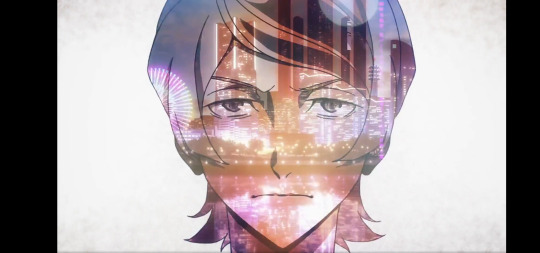
12. Chuuya Nakahara
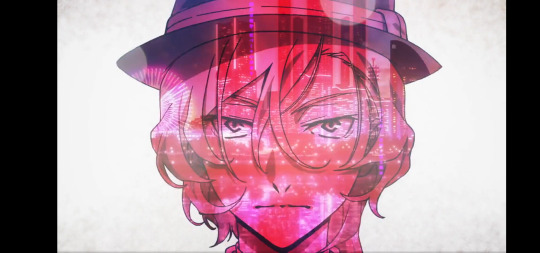
13. Sigma
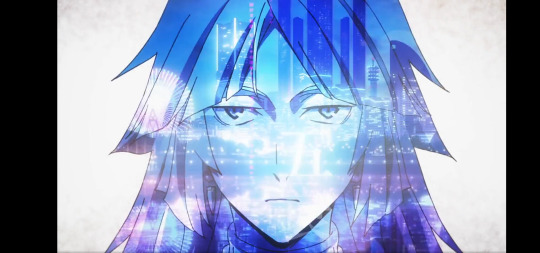
14. Ougai Mori
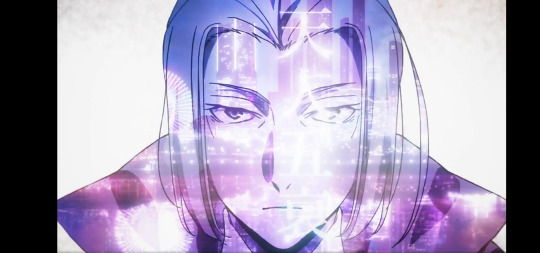
15. Saigiku Jouno
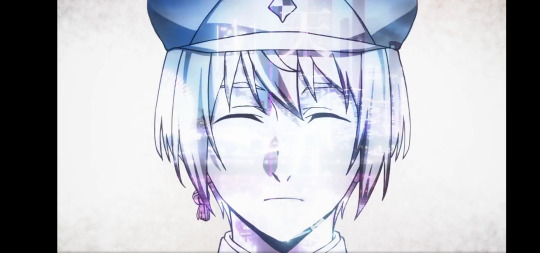
16. Santouka Taneda
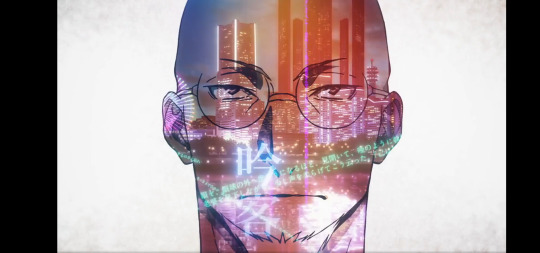
17. Doppo Kunikida
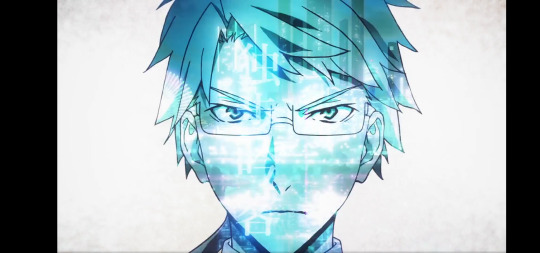
18. Ryuurou Hirotsu

19. Kenji Miyazawa
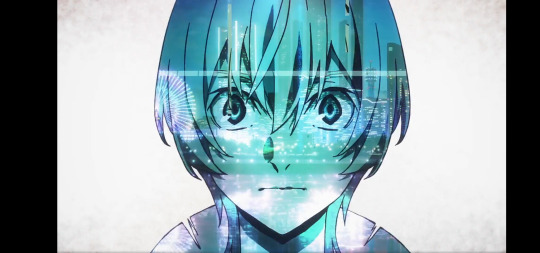
20. Gin Akutagawa
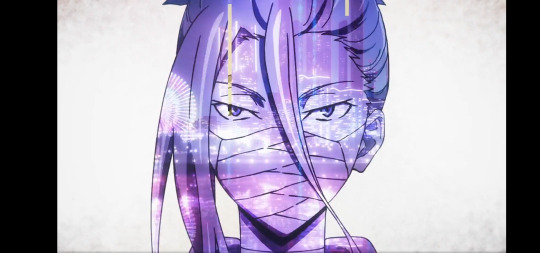
#bsd mushitaro#bsd chuuya#bsd sigma#bsd mori#bsd jouno#bsd taneda#bsd Kunikida#bsd hirotsu#bsd kenji#bsd gin#I'm just sad my wife Higuchi isn't there 😔😔😔#bsd#bungou stray dogs#bsd season 4 opening#bsd season 4#sigma bsd
76 notes
·
View notes
Text

Hello everyone! I opened commissions for the first time. I have 2 slots for sketches and might open more later.
Full body: £25 Half body: £15 Portrait: £9
For more information check out my Carrd: https://youkoheiinfo.carrd.co/
#commisions open#drawing commisions#sketch commission#digital commisions#art commissions#genshin impact#bungo stray dogs season 4#bungou stray dogs#bsd#fanart#anime
3 notes
·
View notes
Text
Just finished watching season 4 of bsd and there was so much happening omg but here are some of the funniest scenes from the season (in my opinion). In no particular order:
Bungou Stray Dogs Season 4 Spoilers
Fukuzawa spending like half a day with Ranpo and then just going “huh- I’m a dad now”
The guy who kidnapped Ranpo going on about the decay of angels and Ranpo just interrupting by mooing
Mushitaro rambling on about how Ranpo will never find out he killed the people and Ranpo just appearing at his side
Poe and the two policemen freaking out over the raven cries as the cellphone ringtone only for Poe to be like “oh it’s mine. I don’t usually get phone calls.” Me too poe. Me too.
Dazai’s face when he got captured. Why did he look like that
Kunikida asking the driver if he had vehicle theft insurance and when he said yes, pulling a gun out and congratulating the driver and saying that he’ll get a new car after this
The “happy life counseling” or whatever it was called with Fyodor and Dazai
The description for one of the episodes being “Kunikida blows himself up with a grenade” cause I had to pause the episode before it even began to stare at that
Mushitaro writing the letter to Yoko and saying that everything was the opposite in prison
Mushitaro wanting to get Atsushi and Kyoka caught and Kyoka simply threatening to stab him every time he tried
Sigma basically making all the wrong choices to hide his stuff from the hunting dogs and then throwing himself out a window
#what WASNT funny was aktugawa being in the opening and then not in the season#give me my silly stupid emo boy#this was the first season I actually kinda knew what the plot was#I’ve gone the other three but simply trying to explain it to my friends and getting nothing#kodzue rambles#bungou stray dogs#bungou stray dogs spoilers#bsd season 4 spoilers#anime. bungou stray dogs
4 notes
·
View notes
Text
Good morning in the new opening Chuuya and Akutagawa are the only people portrayed in bloody red out of the whole cast as foreshadowing for their manga deaths. How did y'all sleep ♡
#“Good morning” I say as I wake up at 2pm#I really need to fix my sleeping schedule like. very hard#bsd#bungou stray dogs#bsd s4#bsd season 4#Also I woke up to 73 asks here and given my previous experience with anon hate I'm now terrified to open my inbox akdbvekavshwosvekavsk
67 notes
·
View notes
Text
still planning on getting to these btw!!!!! juggling art fight, my summer character refinement class, and working part time but they will be drawn eventually trust!
do not hesitate to send me more silly requests!! i know i said bsd only originally but it can be sk8, mha, or demon slayer too :33
battle of my hyperfixations fr
my finals r wrapping up so plssss send me some bsd doodle requests (or any other fandom if u want, i love a lot of things) in my asks!! i want to get back into practice of requests before i open commissions again so it would help super helpful :33
anyway here’s some atsushis from my exam notes >:3



#asks open#send asks#silly art#sketch requests#rqs open#bsd#bsd fanart#bungo stray dogs fanart#bungou stray dogs#sk8 the infinity#sk8 fanart#sk8 anime#demon slayer#demon slayer season 4#kny fanart#kny#mha#mha fanart#my hero academia#bnha fanart#bnha#renga#sk8 renga#bkdk#sanegiyuu#giyuu tomioka
99 notes
·
View notes
Text
Have you too noticed how frequent fisheye lens shots are in bsd? Have you ever wondered how frequent they are? Then look no further than this
Bungou Stray Dogs s1-5 Fisheye Shot™ compilation!
Here, we will consider Fisheye Shots™ to be those shots that frame a character's face in a curved way for a few sustained seconds. We will not count shots where only the background was distorted, nor shots of rooms, objects, animals, or simply mid-action weirdness. If we included those, the counter would go way high (and whoever is stronger than me can deal with that)
Here are the totals!!!!
Season 1: 14!

Season 2: 10!

Dead Apple: 3!

Season 3: 14!
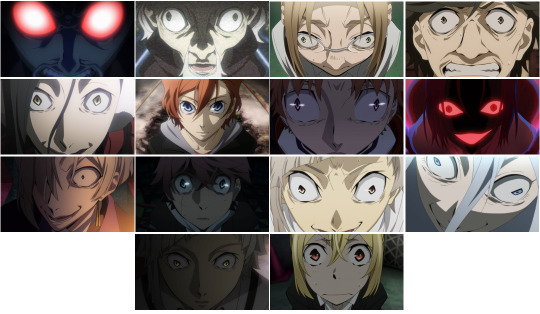
Season 4: 10!

Season 5: 6!

Total: 57
18 Atsushi // 3 Lucy // 2 Higuchi // 2 Dazai // 2 Akutagawa // 2 Yosano // 2 Old Boss // 2 Mushitarou // Kyouka // Q’s doll // Lovecraft // Orphanage director // Fitzgerald // Katsura // Rimbaud // Chuuya // Ace // Karma // Eckleburg // Buchanan // Tanizaki // Mori // Ivan Goncharov // Fyodor // evil secretary // unsuspecting theatre attendee // Ranpo // Kunikida // corrupted politician // Fukuchi // Tetchou
Over 61 episodes of ~23 minutes and one 90 minutes movie, or a runtime of just under 1500 minutes, that makes for one Fisheye Shot™ every 26 minutes of watching! The average amount of Fisheye Shot™ per episode is 0.93, but they only show in about half of the episodes (not counting the s4 opening and Dead Apple). Season 1 and season 3 carry the most (14), while season 5 is the weakest (6).
Here's to season 6 and more! 🥂
>Season 1 compilation< >Season 2 compilation< >Dead Apple< >Season 3 compilation< >Season 4 compilation< >Season 5 compilation< Fisheye Compilation tag
#if i missed one or you don't agree with my criteria well#i fought with it too. join me.#bsd#bungou stray dogs#bungo stray dogs#bsdrewatch2023#bsd fisheye#bsd fisheye compilation#bsd meta#???? does it count#bsd atsushi#bsd nakajima atsushi#<- he suffered the most#apparently i talk sometimes
88 notes
·
View notes
Photo










Bungou Stray Dogs Season 4 op screenshot
#bungou stray dogs#bsd#bungo sd#Season 4#four seasons#opening#bones bsd#mushitaro oguri#Nakahara Chuuya#sigma bsd#Mori Ougai#jōno saigiku#santoka taneda#kunikida doppo#hirotsu ryuurou#Kenji Miyazawa#gin akutagawa#screenshot#anime
100 notes
·
View notes